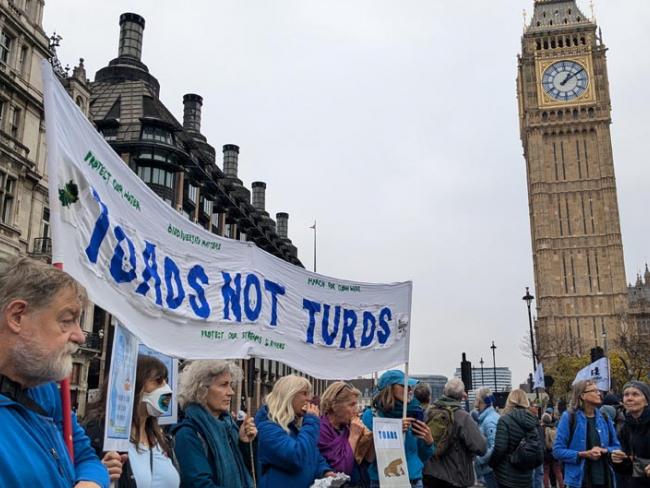
Marching for clean water, London, 3 November 2024. Photo Workers.
The water industry is in crisis, like the rest of capitalism…
The facts about the water crisis speak for themselves. Severn Trent is not going to meet its target water quality – in line with its long-standing failures. Last year it was fined more than £2 million for polluting the River Trent near Stoke-on-Trent in late 2019 and early 2020. Yet its profits tripled to £141 million for the half year to September 2024, and it raised its interim dividend by 4.2 per cent.
Thames Water, our country’s largest water provider, is over £16 billion in debt – and not because it has invested adequately in the much-needed improvement of its infrastructure. Instead, it is guilty of long-term underinvestment.
Thames says it has a possible rescue plan, drawn up by BlackRock and other US asset managing firms. This rescue depends on Thames Water getting a £1.5 billion loan, to be paid back at an annual interest rate of 9.75 per cent, plus fees. And then on taking out a further £1.5 billion loan, but only if it gets regulatory permission to raise its bills. Water industry regulator Ofwat has provisionally said customers’ bills will rise by 21 per cent by 2030.
How else could Thames Water possibly pay back these loans, plus these exorbitant interest rates and fees, except at the expense of its long-suffering “customers”? Yet even more debt will be incurred, to the exclusive benefit of the lending banks.
If the two cash injections come through, and that is not certain, then Thames thinks it may be able to keep operating until May 2026. Of course the quality of the water and the welfare of the public hardly even figure as secondary matters when profit is king.
The one certainty is that Thames’s high levels of pollution, high and rising bills, high dividends, and soaring executive pay and bonuses are all set to continue.
Several other water companies are also seeking yet more loans to make payments on their huge debts. Severn Trent is accused of complex financial engineering to mask the true position. A similar charge was made against Thames.
David Black, the head of Ofwat, has admitted that the water companies need to make “changes across the board”, and that they should never have been allowed to rack up huge debts.
‘Ofwat says bills will rise by 21 per cent by 2030…’
Echoing the government’s mantra about change, Black told a parliamentary committee, “The issues around public anger over storm overflows, sewage discharges, concerns about companies’ corporate behaviours, very clearly signal the need for change…we should have had tighter controls.”
Even after citing the dismal record of the companies over which Ofwat has regulatory responsibility, Black said that he “wouldn’t agree” that Ofwat has failed. And he tried to blame the public for the under-investment, saying, “But it is a challenge in terms of a lot of the criticisms of the sector. That does unsettle investors.”
Corrupt
James Wallace, CEO of River Action, commented, “Of course it’s difficult to raise investment for a corrupt water industry whose name is dirt for killing our rivers, lakes and seas.
“International investors have picked over the remains of water companies like vultures on a decomposing carcass, and proven the privatisation experiment has failed. We need the new Government to show leadership by dealing with the root causes of the sewage pollution scandal, not appease these rapacious, faceless investors.”
But the new government, like the old ones, refuses to nationalise these dreadful companies or effectively police them. They will continue to force the taxpayer to bail them out, unless and until the people who work in the industry, and the public who depend on the industry, take control of it.
